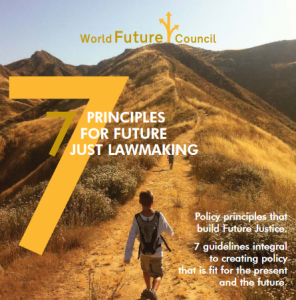Since 2009, we have been celebrating effective policies that create better living conditions for current and future generations with the Future Policy Award (FPA). Each time the prize is dedicated to a different topic. Here you can find out more about the Future Policy Award process: from finding a topic to awarding the prize.
The FPA process
1 Defining a topic
The Council gives us the task, usually at the annual general meeting, to work on a specific topic for the next prize.
3 Research
The Future Policy Award research team reviews all nominations, discusses them with experts and evaluates those that meet the Award criteria. During the evaluation, the research team applies Future Policy Award scoring model of the World Future Council, which is based on the seven principles for future-just lawmaking.
4 Jury
As soon as the evaluation process is completed, we send an evaluation report to a group of internationally renowned experts. The jury meets and first selects policies to be shortlisted and later chooses the winners.
5. Shortlist
First, the shortlist with the top candidates is announced. We raise awareness about these policies on social media and in international media.
6 Announcement of Winners
We announce the official winners: the policies to receive the Future Policy Award.
7 Award Ceremony
We celebrate the winning policies at a high-level awards ceremony.
8 Dissemination
After announcing and awarding the winner policies, we spread information about them by publishing articles in (specialist) media, organising conferences or webinars, presenting the winners at events, etc.
Who can nominate?
Our Councillors, Advisors and selected international organisations can submit nominations for the Future Policy Award. The WFC Research Department reviews the nominated policies and applies the WFC’s seven policy principles, which are based on the Seven Principles for Sustainable Development presented at the 2002 World Summit on Sustainable Development in Johannesburg.
7 principles for future-just lawmaking
The seven principles for future-just lawmaking are applied to all nominated policies. The WFC has developed a methodology for future-just lawmaking that supports legislators in the conception, revision and evaluation of policies. The methodology is based on the seven principles for sustainable development presented by the International Law Association and adopted at the 2002 Earth Summit.
Learn more about the 7 principles
Future justice means making those values essential for survival the basis of every policy and political measure. To support this, we have developed seven principles for future-just lawmaking.




